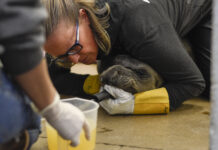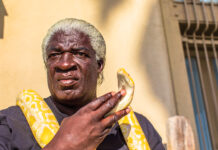Decorum. Courtesy. Togetherness.
Students have used these standards as the foundation to build the Greek system that is prevelent across U.S. colleges and universities.
But as fraternities and sororities have blossomed, these ideals have been lost on many campuses due to hazing, vandalism and drug abuse.
On Oct. 24, 2014, California State University, Northridge, shut down all activities that relate to Greek organizations on campus after a second report in one year of abusive hazing, during which 19-year-old Armando Villa died.
With the integrity of Greek organizations wavering, but some within the system are fighting to retain the ideals of decorum, courtesy and togetherness.
Deandre Pierce, president of the California Zeta Chapter of Phi Delta Theta at CSUN, practices these ideals, and he expects his fraternity brothers will do the same.
Pierce explained that there is a difference between the “frat boy” stereotype and the original intent of the Greek system.
“Frat guys are the typical people you see in movies like Animal House,” Pierce says. “Our fraternity members hold themselves to higher standards. There are three cardinal rules that we live by; rectitude, sound learning and brotherhood. These are the differences. You’ll meet fraternity men, gentlemen, who are willing to work for what they believe in.”
Pierce, who is French-American and says he speaks several languages, hopes to pass along his passion for etiquette and proper behavior to his fraternity brothers after he graduates this year.
Since the death of Villa, rules regarding recruitment and Greek Organization events have changed. Carmen Chandler, a CSUN media relations representative, said “All pledge activities have been suspended indefinitely,” and added that “Greek organizations were forced to deny all applicants.”
In response to recent events, of Phi Delta Theta has made changes to their house rules including, not allowing their members to have alcohol on the fraternity’s premises.
Not everyone at CSUN believes the changes will make a difference.
“It doesn’t serve justice to punish people just because they are affiliated with the same structure,” says television production major Guillermo Hernandez. “What you’re left with is a system that reverses the very goals they stand for. You want to see these organizations thrive, not have their growth cut short.”
Communications major Alfonso Alborres, says that hazing has turned darker during the past few years.
“Back when I first started going here, my group of friends would always make the new initiates do something,” Alborres says. “It was something simple, like asking a girl her name. It was more of a test of commitment.”
For Villa, the test of commitment proved fatal.
Villa died from extreme dehydration as part of a hazing activity, according to a Los Angeles Times article written Sept. 5, 2014. Villa and a group of his fraternity brothers were sent on a hike in the Condor Peak trail in the Angeles National Forest with little to no supplies. “CSUN’s private investigation report concluded that Zeta Mu did engage in hazing but found no evidence that Villa was intentionally deprived of water and proper footwear,” according to Leah Arzu’s article with The Sundial. No criminal charges were filed.
Pierce hopes that Villa’s death will force the Greek organization to return its original ideals of decorum, courtesy and togetherness.
“You know Neil Armstrong? Guess what? He’s a Phi-Delt,” Pierce says. “The first man on the moon is a Phi-Delt. When you associate with people with an elite title, it forces you to work harder. President Benjamin Harrision was a Phi-Delt. We have had all these important people in this organization. So, our [Phi Theda Delta pledges] will be tested. They will be drilled, because they need to know this. This is history. This is life-changing. You are going to join the best of the best, so you need to know about the best of the best.”






